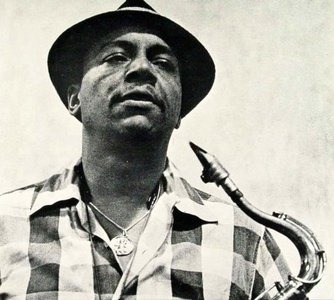Count Basie introduces Jimmy Forrest as “my man” in this rare footage of the saxophonist from a 1974 concert filmed in Poland. Basie said he had a weakness for tenor players, and he hailed Forrest as “the greatest unknown tenor player around.” Today is the St Louis native’s 97th birthday anniversary. He spent a few years with Basie in the mid-seventies, and was generally paired with Eric Dixon in the Basie tradition of two tenors. But on “Body and Soul” and “Night Train,” it’s all Forrest playing in the powerhouse style that made him a favorite of Sonny Liston and a fabulous exponent of the tenor lineage associated with two other Missourians, Coleman Hawkins and Ben Webster.
It used to bug me that Forrest, who worked briefly with Duke Ellington in 1948, copped Duke’s locomotive theme, “Happy-Go-Lucky Local,” and turned it into “Night Train,” a sultry, stop-time favorite of both strippers and bar-walking tenor players. But once I let go and gave him a good listen, I stopped resisting his soulful, robust tenor playing. The same was not true for Ellington, who displayed a rare fit of pique over “Night Train” in The World of Duke Ellington. In a passage about rock’n’roll, which Duke describes as a “brand name” that has no “musical mark of identification [besides] two or three little devices,” Stanley Dance asks if he’s “worried” that rock’n’roll players “may take some of your material?” Duke says, “They [took something] with “Night Train.” They took “Happy-Go-Lucky Local.” It hurts and its offensive. You threaten to sue and you postpone until it’s too late, and then you get real mad. You do nothing but spoil your disposition.”
The interview with Dance took place in 1963, by which time “Night Train” had been covered by Buddy Morrow, Rusty Bryant, Louis Prima, Chet Atkins, Oscar Peterson, and James Brown, all of which underscores the adaptability of blues-based riffs in American popular music. A prominent riff in “Happy-Go-Lucky Local” was first sounded on “That’s the Blues, Old Man,” which was recorded in 1941 by a Johnny Hodges-led group of Ellingtonians that included Duke.
“Happy-Go-Lucky Local” was formally introduced as the fourth and final movement of Ellington’s Deep South Suite, which was premiered at Carnegie Hall in 1946. Here it’s played in Paris in 1963.
Forrest recorded “Night Train” in 1951 for United Records in Chicago. Its success earned him numerous footnotes in r&b and rock’n’roll history including his presence on a bill that Alan Freed presented in Cleveland in March 1952, only days after “Night Train” began climbing the r&b chart. In The Rise and Fall of Popular Music, Donald Clarke writes, “After years as a classical and record request deejay, Freed began playing r&b at the suggestion of a record-shop owner who saw the white kids buying the records. In March 1952, a dance at the Cleveland Arena offered Charles Brown, the Dominoes with Clyde McPhatter, the Orioles, the Moonglows, and the jump bands of Tiny Grimes and Jimmy Forrest. Seventeen thousands fans of Freed’s Rock’n’Roll House Party radio show bought tickets. Unfortunately, the arena held only ten thousand people, and Freed almost went to jail after the resulting melee.” Of course, rather than jail, Freed recognized a good thing and moved on to WINS in New York where he rode a tidal wave of popularity as the man who coined the brand name rock’n’roll.
https://www.youtube.com/watch?v=qndmUKb5lNA
Unlike Freed, footage of the Jimmy Forrest is rare, and the best examples are “Body and Soul” and this performance of “Night Train,” also with Basie. Its blurry quality does nothing to diminish the power of Forrest’s blowing, Butch Miles’s drumming, and the dynamics of the band. Just ask the Count, who smiles and nods his head in time with the tune’s infectious riff before he’s heard proclaiming Forrest one of the greatest. The association didn’t last long, but the pairing of the tenor man and the Basie band was a late-career highlight for both. This was filmed in Kansas City in 1977 as part of the documentary “The Last of the Blue Devils.” Forrest died three years later at 60, Basie in 1984 at 79.



